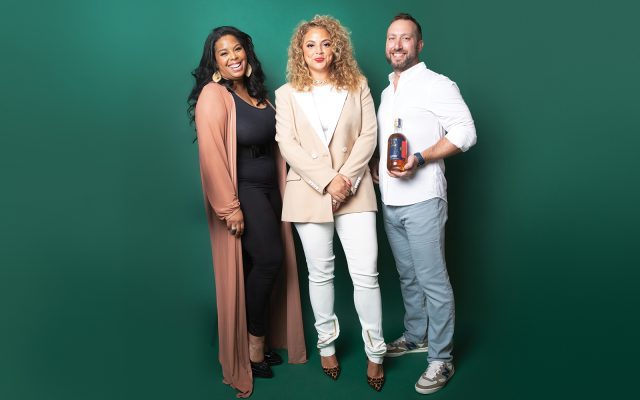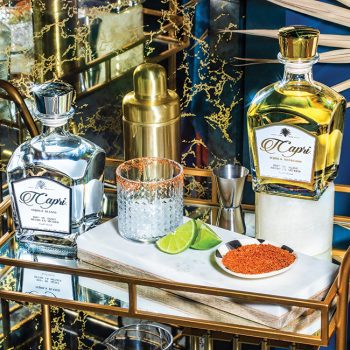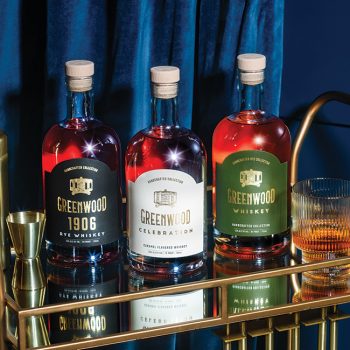This website uses cookies so that we can provide you with the best user experience possible. Cookie information is stored in your browser and performs functions such as recognising you when you return to our website and helping our team to understand which sections of the website you find most interesting and useful.
The big interview: Pronghorn
By Melita KielyThe co-founders of Pronghorn explain their dedication to cultivating the next generation of Black founders and executive leaders in the spirits industry, while also delivering maximum economic impact.

*This feature was originally published in the August 2024 issue of The Spirits Business magazine.
“I know we can change the country. We can actually change the world,” declares Dia Simms, one-third of the co-founding team behind Pronghorn. This is more than blue-sky thinking. Simms says: “We have in common a belief and an audacity of vision, coupled with the execution. That’s a difference maker in that we’re all probably a little crazy in believing that major things can be changed.”
Pronghorn was 20 years in the making, Simms says. Together with Erin J Hall and Dan Sanborn, Pronghorn came to fruition in 2021. The 10-year initiative aims to drive diversity, equity and inclusion in the spirits industry. “It was a two-decades-old brainstorm,” Simms continues, “but it certainly accelerated during Covid. During that time, the US – and the world, really – was in a little bit of a racial reckoning. We thought, look, why don’t we build something that actually templates how to effectively diversify the industry, so that underserved populations have a chance to participate fully from an economic advantage. Underserved populations can solve a lot of their own problems when they have the right financial wherewithal to do so.”
The trio started to seriously work out what would be required to achieve this effective diversification of the industry. While the stakes were high, the returns were potentially higher. By investing in 57 Black-owned spirits brands, the founders calculated they could generate US$2.4 billion in economic value and generational wealth among the Black community by 2032. “Black Americans make up 12% of the consumer pool in the spirits industry but are only represented at a 7% level when it comes to employment,” explains Hall. “Then when you look at the executive level, that’s only 2%. And if you extracted Black women from that, you’re probably looking at 0.5%. We really had a lot of work to do to close the gap.” Part of that will come from the 1,800 roles in the spirits industry that Pronghorn intends to have filled with Black talent over 10 years.
“We look at everything with an entrepreneur approach to create wealth, a legacy, and to build companies for the Black community,” Hall adds.
“We also look at getting executives into the building to actually make key decisions that will eventually help, and diversify the thinking and the perspective of everybody in that building.”

Recent investments
To date, Pronghorn has invested in 25 brands. One of its most recent investments was Shinju Spirits, which this year became the first Japanese whisky producer to receive investment from the company. Other beneficiaries include singer Ciara, co-owner of Ten To One rum, and female-founded Acquired Taste Cognac, New England Sweetwater Farm & Distillery, and Rally Gin.
But the support Pronghorn offers – not just to investment brands, but to any Black-owned spirit seeking help – goes deeper than the provision of financial aid. It’s about creating data, providing brands with information to help them move more efficiently – from every aspect of business, spanning supply chains to marketing.
“At the end of the day we want them to get acquired – so what does that look like? What is that journey? And how are we helping them?” asks Hall. It’s about equipping brand owners with the tools to successfully further their businesses.
Mentorship opportunities play a key role in these efforts. So far, Pronghorn has completed more than 300 hours of mentorships. Furthermore, this year the team created a docuseries, starting with Delta Dirt, a distillery in Arkansas. It tells the story of the family that built the distillery, the history of the land, and the challenges they faced on their journey. Sanborn was instrumental in securing distribution for the docuseries on AMC+, an American subscription-video-on-demand streaming service, and its launch this August during Black Business Month. “We think it’s a key part of our work to tell these stories,” says Hall. “How can we change the narrative and make the Black community feel like the spirits industry is for them?”
While the figures previously stated may sound shockingly low to many in the industry, they were not so surprising to the Pronghorn founders. Simms, Hall and Sanborn all bring years of experience in the spirits industry to the organisation. Simms and Hall are well-versed in brand-building, and were pivotal in the success story of Cîroc vodka. Sanborn also enjoyed a successful tenure at Cîroc owner Diageo, working on the supply side of the business for 16 years, and the culture and partnerships team, which positioned him on brands such as Don Julio.
Hall recalls her and Simms’ earlier career years: “We would literally go around on these tours, meet distributors, pitch them the brand, and many times we would be the only Black people in the room – and definitely the only Black women in the room. So, as Dia said, this is two decades in the making; it’s literally been throughout our career. We saw the disconnect. We just didn’t quite know the numbers until we did all the research to find out exactly where we stood. But I think we already had a gut instinct that we needed to make this change.”
However, there’s more. Billions of dollars of private-equity investment are pumped into businesses in the US. But of those billions of dollars being invested, only 1.2% goes to Black founders, Sanborn explains. “Even just accessing capital to start the business is hard,” he says. “Typically, when founders start in business, the first million dollars comes from friends and family. Well, where does that money from friends and family come from? Typically, from owning homes. When you look at home ownership in the United States, it’s not on a level playing field for Black Americans either. The question, then, was how do we create something that becomes a little bit less frictionless, meaning there’s capital going into Black founders’ businesses?”
Positive progress has been made, all three founders note. From a handful of Black-owned brands a decade or two ago, there are “well over 140”, Sanborn says. Plus, in the past two years, Pronghorn has effected a 5% lift in Black American employment year on year, he adds.

“More people are aware of this industry than would have been 10 years ago,” Sanborn says. “Some of that’s by virtue of some of the big brands that we’ve seen be successful. The best commercial for diversity and inclusion is commercial success.”
Out of the US$1.8 trillion the Black community is set to spend by the end of 2024, US$3bn to US$4bn is due to go to the spirits industry, the founders highlight. High spending potential means high career potential too, provided support and opportunities are offered. This year, the Pronghorn team has been focusing on HCBUs (holistically Black colleges and universities) through career-engagement platforms, creating activations to encourage graduates to sign up to Pronghorn’s mentorship and internship programmes.
“From there, we actually work with people individually and customise what that growth path looks like through our spirits-prep programme,” Hall explains. “Every step of the way, from the internship to the mentorship to the spirits-prep programme, we’re working on improving and closing the gap of that learning curve.”
Ambassador programme
So far, Pronghorn has successfully attracted more than 430 HCBU students through these programmes. Next year, the team will launch its HCBU ambassador programme, where graduates from the programmes will go out and work on Pronghorn’s behalf as graduates. The hope is they will help others realise that a career in the spirits industry could also be for them. “It’s funny because last year we launched our first HCBU homecoming tour, and about 80% of homecoming is alumni,” Hall notes. “So it’s the perfect place where you can reach over a million alumni across the five schools. We ended up signing up 1,200 possible talents to submit their resumés. We’ve looked at those resumés, and we’ve pushed them through to contribute to that 5% lift. In everything we do, we apply key performance indicators, and we make sure when we step on a campus or when we’re communicating with alumni groups, we understand who they have on their database and how those individual traits can transfer over to the spirits industry.”
Simms says: “I would add that it boils down to what our team wakes up and thinks about every day. It’s driving entrepreneurship. The truth of the matter is, the math bears out that we’re investing in 57 companies. All of them might not be successful, but they might also be the next Hennessy or Crown Royal, right? Or the people involved may be the new supply person on Tanqueray.”
‘Math-based, heart-led’
As that magic number keeps cropping up in conversation, how did the trio land on 57 brands? “We’re math-backed, heart-led,” says Sanborn. “As we looked at having an economic impact of US$2.4bn over 10 years, we were very specific about how many brands we would need to invest in. How many employees would we ultimately need to drive into the industry? Fifty-seven was the number of brands, as we looked at angel investments, seed investments, and accelerator investments. It’s an important point. When you look at the conversation around diversity, it gets hijacked by conversations about being a zero-sum game, taking from someone else or a forced mandate. That is not what this is at all. We believe the pie is big enough for everyone to participate, the table is big enough for everyone’s seat. So this is truly a commercial endeavour.”
Diageo is the anchor-investment provider for Pronghorn – but the team is clear that Pronghorn is a standalone company. In 10 years, the founders hope to be self-financed, but count themselves “incredibly lucky” to have Diageo’s support.
Hall adds: “We are fortunate to have Diageo set a tone, and make a really big commitment. Then as a tribute to the industry, they’ve followed suit in recognising the opportunities that a company like Pronghorn brings. We’re putting in the hard work to discover new brands, and we’re finding these amazing jewels.”
Hall highlights how Diageo’s values resonate with those of Pronghorn. The group, whose portfolio includes Johnnie Walker and Smirnoff, has a female global CEO, Debra Crew, and a female CEO for North America, Sally Grimes, to name just two high-profile women at the company in C-suite positions. “I remember a few years ago, there were fewer than 30 women CEOs in the whole Fortune 500 in the United States,” Hall says. “Diageo already having so many women in the ranks is actually quite unusual in and out of our industry. We’re grateful for their leadership.”
When it comes to selecting which brands to back financially, Pronghorn takes multiple factors into account. The metrics are not only financial; stability, scalability, growth potential and strategy requirements for success are all taken into account. While diversity is at Pronghorn’s core, it is a commercially forward business. Brands must be, therefore, commercially viable and valuable businesses. “We are not a traditional venture-capital company. We’re inspired by some accelerators on ESG [environmental, social and governance] models, but our mission, at the end of the day, is to diversify the industry,” notes Sanborn.

Improve diversity
In the future, Pronghorn will eventually break out of spirits, the founders hope, and help other industries use its blueprint to improve diversity in other sectors. For now, the team is working to build an “unimpeachable case study” with the existing population of Black Americans and the spirits industry.
“The reason why we are building open code, and we’re happy to share the methodology, is because we want to be able to attract organisations who want to do the same thing,” Simms explains. “We’re fortunate to have already had meaningful interests from other geographies and other industries. We are working with Quinnipiac [University, in Connecticut] to make sure that we’re documenting everything very closely with scientific rigour.
“Candidly, we think there are larger implications for this, potentially just even in the United States, because it pertains to larger systems. But what’s most important to us, particularly as we look at these first three-and-a-half years, is building this airtight case that can be replicable and scalable.”
Pronghorn is on track to meet its ambitious targets; it is on course for employment and ahead on investment. By the end of its 10-year plan, those aforementioned 1,800 placements would affect the average Black American hourly wage in the US by more than US$7 an hour.
Once again, the maths speaks volumes. “Diversity is only going one way – and that’s up,” Simms adds. “If you want your revenue to follow, you actually have to take it quite seriously.”
Related news
Tanqueray taps dreams for cocktail creation

